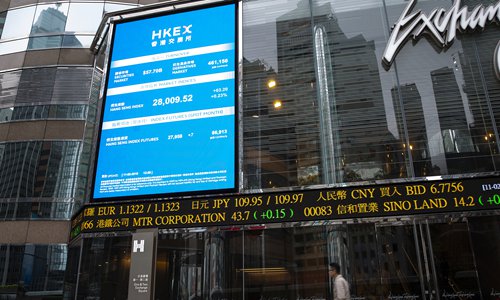HOME >> SOURCE
Hong Kong ranks top among global bourses by deals, proceeds: report
By Zhang Dan Source:Global Times Published: 2019/12/17 20:43:40

A view of the Hong Kong Stock Exchange's building in February Photo: VCG
The Hong Kong Stock Exchange (HKEX) has regained the global IPO crown this year by deal volume and proceeds, according to a report sent by Ernst & Young (EY) to the Global Times on Tuesday.
Experts said that the success of Alibaba's IPO may boost secondary offerings from more Chinese companies that were listed overseas, and the HKEX's achievements will generate more confidence in the Hong Kong bourse next year while social unrest in the city has gradually died down.
As of December 5, 159 companies had been listed in Hong Kong in 2019, down 22 percent year-on-year, said the EY report. But the amount of funds raised will reach HK$310.5 billion ($39.86 billion), up 8 percent year-on-year, it said.
By comparison, Nasdaq said Monday that The Nasdaq Stock Market raised a total of $34.3 billion in 2019.
It's worth noting that more than 60 percent of the IPOs come from the Chinese mainland, with the funds raised representing 76 percent of the total, EY noted. Compared with 2018, their proportion in the number of deals increased while the proceeds dropped.
Driven by Chinese e-commerce behemoth Alibaba Group's IPO in Hong Kong, the telecom, media and technology (TMT) sector came under the spotlight and led IPO activities by proceeds.
EY noted that funds raised by Alibaba accounted for 92 percent of total proceeds from TMT issues.
"The secondary listing of Alibaba plays a great strategic role for Hong Kong. Now the bourse has both Tencent and Alibaba and this will further improve the investment value and international status of the Hong Kong stock exchange," Dong Dengxin, director of the Finance and Securities Institute at the Wuhan University of Science and Technology, told the Global Times on Tuesday.
On Tuesday, Alibaba's Hong Kong shares closed at HK$203.8, up 1.39 percent.
Terence Ho, EY greater China IPO leader, noted in the report that more companies from the mainland are expected to be listed in Hong Kong through carve-out listings due to its relatively lower entry requirements. He added that new economy companies, including TMT and healthcare enterprises, will remain a growth engine of IPO activity in the city.
Hong Kong is expected to face downside risk due to the slow economy and markets as a result of trade tension and geopolitical uncertainties. However, EY predicts Hong Kong will see a steady performance against ongoing headwinds with estimated funds raised of HK$220 billion, Ho said, noting the number will reach about HK$350 billion if there are mega IPOs in Hong Kong next year.
"The riots in Hong Kong have gradually quieted down, so the concerns that companies eyeing listings in HKEX have will decrease," Dong said, noting that securing public order is still necessary for Hong Kong's financial market.
The Shanghai Composite Index rose by 1.27 percent to 3,022.42 points on Tuesday, breaching the long-awaited 3,000-point level, while the Shenzhen Composite Index rose by 1.45 percent to 10,306.03 points, due to the driving force of financial and technology stocks.
Analysts gave credit to the resilience of A-shares and the agreement on the phase one economic and trade deal between China and the US.
Posted in: MARKETS